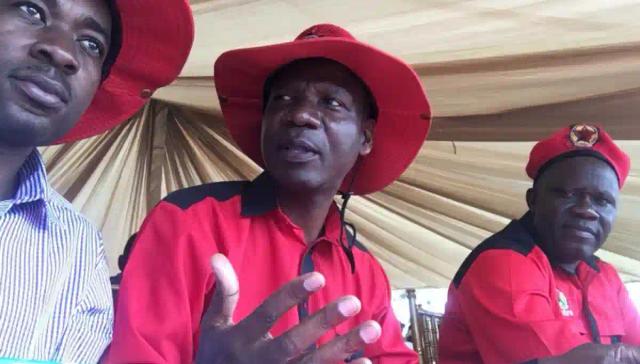Mthuli Ncube's Budget A Tragedy - ZCTU

Statement by Zimbabwe Congress of Trade Unions (ZCTU) Secretary General Japhet Moyo on the 2024 National Budget president by Finance, Economic Development, and Investment Promotion Minister Mthuli Ncube on Thursday, 30 November 2023.
The ZCTU has noted with shock and disbelief the proposed 2024 National Budget announced by Finance Minister Mthuli Ncube which has strong traits of capitalism with tragic consequences to workers and the ordinary person.
Hinged on brutal taxation, the budget has failed to rescue the already underpaid workers by pegging the PAYE tax-free threshold to a paltry Z$750000-00 from 1 January 2024.
A fair tax-free threshold in USD was more sensitive and welcome to workers than this pittance which would be eroded to nothing before it was even effected. The budget is ignorant of the glaring fact that the economy has self-dollarize hence wages and salaries also need to be in USD.
FeedbackIt is a fact that the erosion of purchasing power has exacerbated an already difficult situation for the poor and vulnerable, especially the working class.
The proportion of the working poor has increased markedly with average salaries lagging behind the poverty datum line (PDL).
HOT DEALS:
itel A70 - (128GB, 3GB RAM) $89,
itel A70 - (256GB, 4GB RAM) $99
itel P40 (128GB, 4GB), (6000mAh) $99
itel P40 (64GB, 4G), (6000mAh) $93
Cash on Delivery in Harare & Bulawayo. Tinotumira kwamuri inosvika.WhatsApp: 0783 450 793
The average minimum wage in Zimbabwe as of October 2023 was about US$230. The World Bank’s international poverty line is US$2.15 per day.
The government has piled taxes on the ordinary people by increasing fuel tax, introducing the wealth tax, and sugar tax, and sharply increasing passport, toll and vehicle registration fees among a cocktail of other blood-sucking measures.
These proposals clearly indicate that the powers in government are detached from the lived realities of most citizens.
Our view is that the tax regime in the country is already burdensome.
It will result in a drastic increase in the cost of accessing public services, transport and logistics, the price of fuel, and the overall cost of doing business in the country.
A sensitive government would not punish its struggling citizens by taxing them to the marrow.
Service providers will cushion themselves by parcelling the burden to the end user by charging exorbitantly.
The cost of living will spike in 2024 and poverty levels are likely to rise and the government has already approved the mass suffrage by turning a blind eye to the wanton pillage.
The budget has also failed to alleviate the raging informality by barring unregistered entities from buying from manufacturers.
The larger population is in the informal economy and it is common cause that they will be adversely affected by this measure.
In any case, the budget does not contain any direct employment creation incentives and strategies which is a concern, especially given the fact that the country is facing huge employment-related challenges arising from an increase in proportion of informal and vulnerable employment.
Given the high levels of informality, the budget should support and facilitate transitioning from informality to formality.
Integrating informal enterprises into the formal economic fabric is particularly vital for effective domestic resource mobilisation as it expands the tax base.
Vote allocations still remain below regional and global benchmarks. For instance, education got the highest vote at Z$10.3 trillion constituting 17.7% of the total vote allocations, this is still below the Dakar Declaration target of 20%.
Health got Z$6.3 trillion (10.8%), a decline from the 11.2% allocated in 2023, below the Abuja Declaration target of 15%. Agriculture got Z$4.3 trillion, which is 7.4% of the total votes and is below the Maputo Declaration target of 10%.
Public Service, Labour & Social Welfare which is responsible for social protection got ZW$2.4 trillion, which is 4.1% of the total votes and 1.5% of GDP.
According to the Social Policy for Africa Agreement (2008), African Gvts must spend at least 4.5% of GDP on social protection.
In the midst of a cholera outbreak & addressing this requires significant public investments in Water, Sanitation and Hygiene (WASH).
Gvt has allocated ZW$ 608.3 billion towards WASH which represents just 0.4% of GDP, which is way below the 1.5% of GDP benchmark.
We expected gvt to be awake to the realities of the majority and come up with a pro-poor budget.
The only way to relieve workers and ordinary people is to dollarize the economy, pay wages and salaries in USD, and lower taxes so that people have meaningful disposable incomes.
We urge parliamentarians to reject the tragic bill that is sending the majority to the gallows and for the government to revise it to humane standards
JAPHET MOYO
SECRETARY-GENERAL
More: Pindula News
Tags
15 Comments
Leave a Comment
Generate a Whatsapp MessageBuy Phones on Credit.
More Deals





